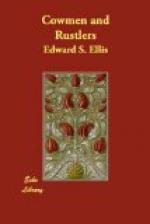The parting glimpse showed him leaning forward on his horse, who was plunging at utmost speed straight away in the gloom. A half dozen shots were sent after him and something like pursuit was attempted, but brief as was the start gained it was sufficient, and he was soon beyond all danger.
CHAPTER XXI.
A messenger in haste.
The daring escape of the prisoner did not tend to improve the temper of Capt. Asbury, and he indulged in a number of emphatic expressions, during which Monteith Sterry was dignified enough to hold his peace.
But the leader of the stockmen quickly recovered his self-poise and accepted the matter as one of the peculiar incidents liable to take place at any time.
His version of the difficulty with the rustlers differed from that given by Vesey. They rode up to the house, not knowing who dwelt there, and were received with a shot, which, fortunately, did no damage. Duke Vesey was at the rear, near the structure in which the horses were stabled, when he hurriedly mounted and dashed off, just as he had recently done. He did not make a fight like his companion, who, as was represented, stood his ground. He was repeatedly summoned to surrender, but paid no heed to it, and it became a choice whether to shoot him down or allow him to empty the saddles.
While Sterry could not feel so well disposed toward Vesey after hearing this account, he did not regret the part he had acted, and he was also suspicious that Capt. Asbury had tinged his version with a little romance.
The incident itself was of small moment, but the consequences were likely to be far-reaching and important. One of the rustlers had fallen and his companion had escaped. His story of the fight would place the blame wholly upon the stockmen and inflame the feeling between the rustlers and ranchmen, already at a dangerous intensity.
Capt. Asbury was out with his men for the purpose of arresting several of the most notorious of the offenders against the law. Those rustlers were sufficiently powerful to make trouble. If they were given time to organize they could sweep the captain and his little party from the earth. There was reason to believe they would do that very thing, now that Duke Vesey was at liberty to spread his account of the last outrage.
Capt. Asbury held a brief consultation with his men, all, including Sterry, taking part. The consensus of opinion was that they ought to effect a junction with some of the larger parties of stockmen known to be abroad, or withdraw to some safe point like Buffalo, Riverside, or the nearest military station.
Ira Inman, Larch Cadmus and the others were on the “war-path,” and at no great distance. Morning would probably find them in sight, if the stockmen should stay where they were.
Capt. Asbury decided to ride to the westward, in the hope of effecting a junction with friends or of reaching a point where they would be secure against their assailants.




